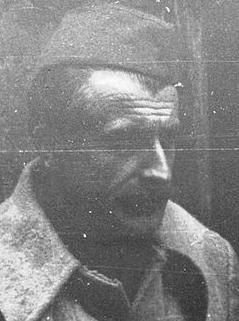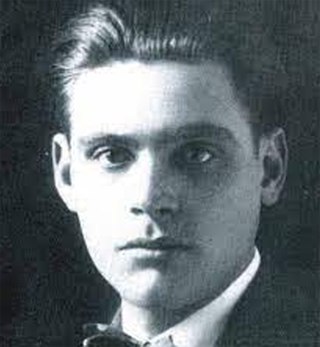Ivan Aralica | |
|---|---|
 | |
| Born | 10 September 1930 [1] [Notes 1] Promina, Kingdom of Yugoslavia |
| Occupation | Novelist, essayist, politician |
| Period | 1967–present |
Ivan Aralica (born 10 September 1930) [1] [Notes 1] is a Croatian novelist and essayist.
Ivan Aralica | |
|---|---|
 | |
| Born | 10 September 1930 [1] [Notes 1] Promina, Kingdom of Yugoslavia |
| Occupation | Novelist, essayist, politician |
| Period | 1967–present |
Ivan Aralica (born 10 September 1930) [1] [Notes 1] is a Croatian novelist and essayist.
Born in Promina near Knin, and having finished pedagogical school and Philosophical Faculty at the University of Zadar, Aralica had worked since 1953 as a high school teacher in the backwater villages of the rural hinterland of northern and central Dalmatia. [2] After a period of communist infatuation (which resulted in a few weak novellas that can be labeled as socialist realism period pieces), Aralica was swept into the vortex of turbulent events known as the Croatian Spring (1971). During this tumultuous era he allied with those who advocated greater Croatian autonomy and freedom for Croatian people in the Socialist Federal Republic of Yugoslavia. The crackdown on the Croatian national movement and subsequent professional and social degradation resulted in Aralica's return to his Christian and Catholic roots, abandonment of doctrinaire propagandist literature and formation of his own literary credo. Among world authors, he was influenced chiefly by realist fiction and early modernism, the key authors being Ivo Andrić, Thomas Mann and Knut Hamsun.[ citation needed ]
From 1979 to 1989 Aralica published eight novels, which can be best described as modernist rewritings of historical fiction. The best among them (Psi u trgovištu/Dogs at a bazaar , 1979; Duše robova/Slaves' souls, 1984; Graditelj svratišta/Builder of an inn, 1986; Asmodejev šal/Asmodey's shawl, 1988) show similar traits: these are essentially novels of complex narrative techniques recreating dramatic events in Croatia and Bosnia and Herzegovina from 16th to 18th century and describing historical fatum of Croats caught in the "Clash of Civilizations"- a three centuries long warfare between the Austrian Empire, the Ottoman Empire and Venice. Aralica successfully mastered many divergent elements in his fiction, so that his finest novels are both replete with contemplative wisdom sayings on human condition and rammed with action; also, his artistry is expressed in numerous naturalist passages integrated in the overarching Christian vision of life where natural and the supernatural fuse into one reality.
After the reintroduction of a multi-party system in 1990 and subsequent breakup of Yugoslavia, Aralica was elected to the Croatian Academy of Sciences and Arts; also, he re-entered politics, this time on the list of Croatian Democratic Union (HDZ), then headed by the first president of Croatia since its independence Franjo Tuđman. Aralica held a few influential positions, the most important among them being vice-president of Croatian Parliament. During this period he wrote two books of political essays (one about the genesis of Serbian imperialism, the other on historical complexities of the Bosnian War), and two other novels.
The year 2000 was another turning point for Aralica: his party, HDZ, lost the elections and power, and writer was embroiled in a bitter polemic with new authorities (which were to hold power for the next four years). Aralica began writing satirical romans à clef (thinly disguised quasi-fiction). [2] The most famous one is Fukara ("Good for nothing") from 2002, a satirical-political attack on "multi-culturalist ideology" as promulgated by controversial American billionaire George Soros. The literary value of his works published during this period was often disputed, and they were seen by many left-wing literary critics (Perišić, Jergović, Tagirov, Alajbegović) as little more than tasteless political pamphlets. However, Aralica has also become one of the cultural and intellectual icons of nationalist conservatism in Croatia, advocating the return to the tradition symbolized by "ognjište" ("hearth"). Intellectuals on the political right defended his novels claiming that they were brilliant political satires.
Still vigorously writing in his eight decade, Aralica is considered[ by whom? ] one of the best Croatian novelists of the second half of the 20th century.

The Croatian Spring, or Maspok, was a political conflict that took place from 1967 to 1971 in the Socialist Republic of Croatia, at the time part of the Socialist Federal Republic of Yugoslavia. As one of six republics comprising Yugoslavia at the time, Croatia was ruled by the League of Communists of Croatia (SKH), nominally independent from the League of Communists of Yugoslavia (SKJ), led by President Josip Broz Tito. The 1960s in Yugoslavia were marked by a series of reforms aimed at improving the economic situation in the country and increasingly politicised efforts by the leadership of the republics to protect the economic interests of their respective republics. As part of this, political conflict occurred in Croatia when reformers within the SKH, generally aligned with the Croatian cultural society Matica hrvatska, came into conflict with conservatives.

Stjepan "Stipe" Mesić is a Croatian lawyer and politician who served as President of Croatia from 2000 to 2010. Before serving two five-year terms as president, he was prime minister of SR Croatia (1990) after the first multi-party elections, the last president of the Presidency of Yugoslavia (1991) and consequently secretary general of the Non-Aligned Movement (1991), as well as speaker of the Croatian Parliament (1992–1994), a judge in Našice, and mayor of his hometown of Orahovica.

The Croatian Democratic Union is a major conservative, centre-right political party in Croatia. It is one of the two major contemporary political parties in Croatia, along with the centre-left Social Democratic Party (SDP). It is currently the largest party in the Sabor with 62 seats. The HDZ governed Croatia from 1990 before the country gained independence from Yugoslavia until 2000 and, in coalition with junior partners, from 2003 to 2011, and since 2016. The party is a member of the European People's Party (EPP). The HDZ's leader, Andrej Plenković, is the current Prime Minister of Croatia, having taken office following the 2016 parliamentary election.

Miljenko Jergović is a prominent Bosnian writer.

Ivan Cankar was a Slovene writer, playwright, essayist, poet, and political activist. Together with Oton Župančič, Dragotin Kette, and Josip Murn, he is considered as the beginner of modernism in Slovene literature. He is regarded as the greatest writer in Slovene, and has sometimes been compared to Franz Kafka and James Joyce.
Feral Tribune was a Croatian political weekly magazine. Based in Split, it first started as a political satire supplement in Nedjeljna Dalmacija before evolving into an independent satirical weekly in 1993. It became a popular political weekly in the 2000s before ceasing publication in June 2008.

The Croatian Party of Rights of Bosnia and Herzegovina is an extra-parliamentary party in Bosnia and Herzegovina that represents the ideology of Ante Starčević. The main goals of the HSP BiH are changes to the Treaty of Dayton, abolition of entities and subdivision of Bosnia and Herzegovina into territorial units.

Skender Kulenović was a Bosnian poet, novelist and dramatist.

Vladan Desnica was a Yugoslav writer and translator.

Antun Vrdoljak is a Croatian film actor and director, sports official, and head of Croatian Radiotelevision during the Yugoslav Wars. Between the 1960s and early 1990s he was mainly a film artist. In the early 1990s he became involved in politics and became a prominent member of the Croatian Democratic Union (HDZ), which led to his appointment to a series of offices. He was director general of Croatian Radiotelevision (1991–1995), and president of the Croatian Olympic Committee (1991–2000).

Vareš is a town and municipality located in Zenica-Doboj Canton of the Federation of Bosnia and Herzegovina, an entity of Bosnia and Herzegovina. It is situated in central Bosnia and Herzegovina, and is famous for the local mining activities and production of iron. As of 2013, it has a population of 8,892 inhabitants, with 2,917 in the town itself.

Croatian nationalism is nationalism that asserts the nationality of Croats and promotes the cultural unity of Croats as well as Roman Catholicism.
Ivan Supek was a Croatian physicist, philosopher, writer, playwright, peace activist and humanist.

The Republic of Bosnia and Herzegovina was a state in Southeastern Europe, existing from 1992 to 1995. It is the direct legal predecessor to the modern-day state of Bosnia and Herzegovina.

The Croats of Bosnia and Herzegovina, often referred to as Bosnian Croats or Herzegovinian Croats, are the third most populous ethnic group in the country after Bosniaks and Serbs, and are one of the constitutive nation of Bosnia and Herzegovina. Croats of Bosnia and Herzegovina have made significant contributions to the culture of Bosnia and Herzegovina. Most Croats declare themselves Catholics and speakers of the Croatian language.

Matica hrvatska is the oldest independent, non-profit and non-governmental Croatian national institution. It was founded on February 2, 1842 by the Croatian Count Janko Drašković and other prominent members of the Illyrian movement during the Croatian National Revival (1835–1874). Its main goals are to promote Croatian national and cultural identity in the fields of art, science, spiritual creativity, economy and public life as well as to care for social development of Croatia.
Croatian literature refers to literary works attributed to the medieval and modern culture of the Croats, Croatia, and Croatian. Besides the modern language whose shape and orthography was standardized in the late 19th century, it also covers the oldest works produced within the modern borders of Croatia, written in Church Slavonic and Medieval Latin, as well as vernacular works written in Čakavian and Kajkavian dialects.

Yugoslavism, Yugoslavdom, or Yugoslav nationalism is an ideology supporting the notion that the South Slavs, namely the Bosniaks, Croats, Macedonians, Montenegrins, Serbs and Slovenes, but also Bulgarians, belong to a single Yugoslav nation separated by diverging historical circumstances, forms of speech, and religious divides. During the interwar period, Yugoslavism became predominant in, and then the official ideology of the Kingdom of Yugoslavia. There were two major forms of Yugoslavism in the period: the regime favoured integral Yugoslavism promoting unitarism, centralisation, and unification of the country's ethnic groups into a single Yugoslav nation, by coercion if necessary. The approach was also applied to languages spoken in the Kingdom. The main alternative was federalist Yugoslavism which advocated the autonomy of the historical lands in the form of a federation and gradual unification without outside pressure. Both agreed on the concept of National Oneness developed as an expression of the strategic alliance of South Slavs in Austria-Hungary in the early 20th century. The concept was meant as a notion that the South Slavs belong to a single "race", were of "one blood", and had shared language. It was considered neutral regarding the choice of centralism or federalism.

Darko Hudelist is a Croatian journalist, non-fiction writer and researcher of contemporary history.
Bora Ćosić is a Serbian, Croatian and Yugoslav novelist, essayist, translator, public intellectual, and dissident. He wrote about 50 books, as well as several theater plays, which were played with great success in the Belgrade Atelje 212. For the novel The Role of My Family in the World Revolution, he received the NIN Award for Novel of the Year in 1970. Ćosić strongly denounced the rise of Serbian nationalism in the 1990s and the politics of Slobodan Milošević. Born in 1932 in Zagreb, he lived in Belgrade from 1937 to 1992, when he moved to Berlin.